The beach in Nuquí, Colombia
In the Colombian department of Chocó, the tourist facilities are still a little underdeveloped. Is that bad? True luxury is an empty beach, with diving whales on the horizon. Travel journalist Jurriaan Teulings travelled to the town of Nuquí and wrote about it in our Magia Latina Magazine.
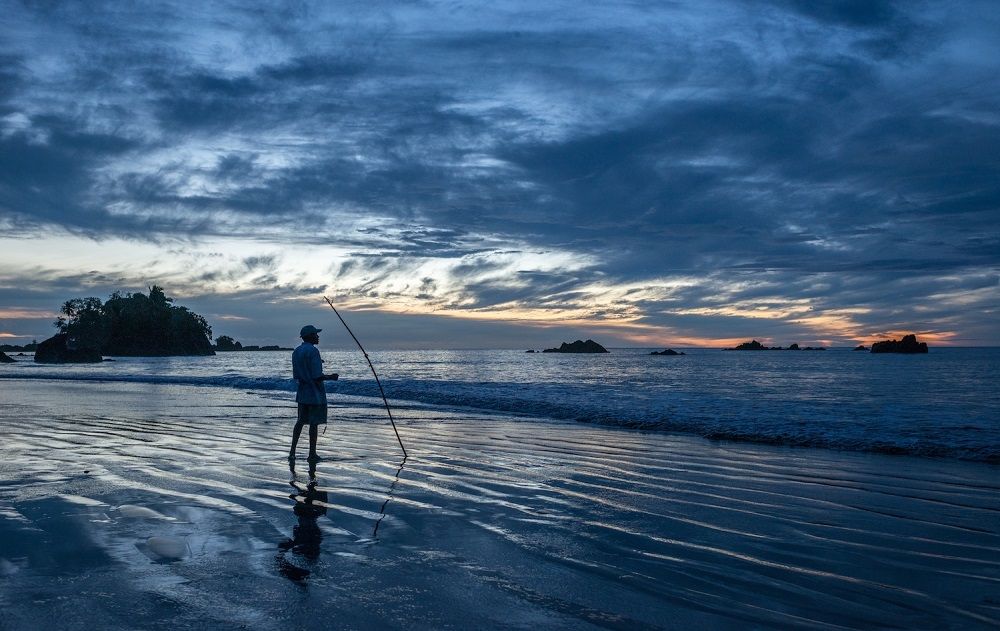
Jurriaan Teulings about Nuquí, Colombia
The plane from Medellín is barely a quarter of an hour's journey when the Andean mountains below us run into a vast jungle. The greenery reaches in all directions, as far as the eye can see. It is only when the blue of the Pacific Ocean appears that we begin the descent to the coastal town of Nuquí. After a big bend over the beautiful water we shave so flat over the jungle that I can almost touch the red flowers in the foliage.
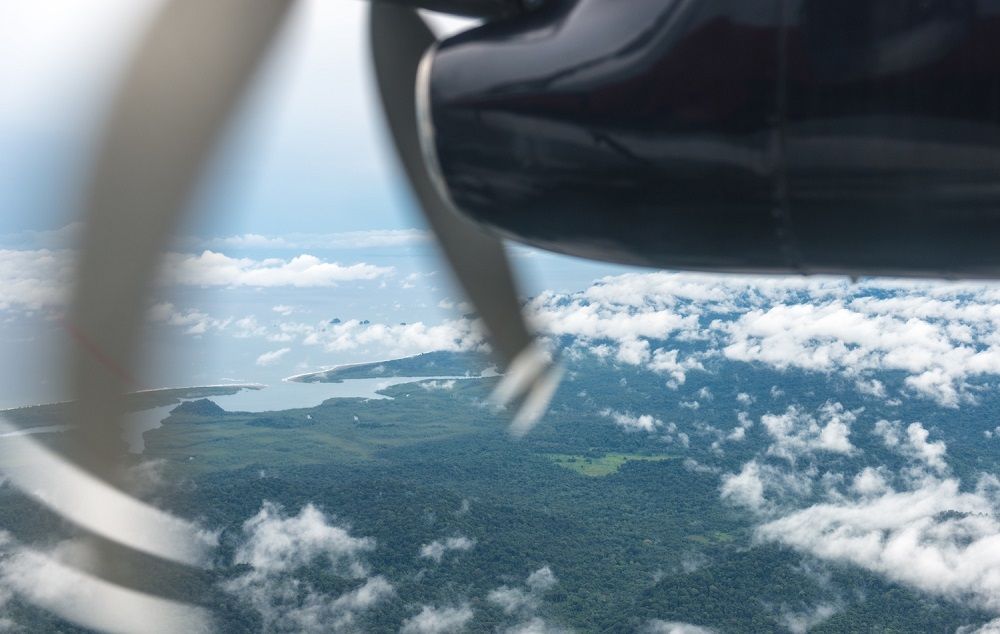
Chickens are walking between the airstrip and the terminal. A man holds up my nameplate, and after a handshake he carries my suitcase to a small boat waiting just outside the airport. A little later we sail up the ocean, along the coast southwards, to ecolodge La Joviseña. There I am assigned my own cabin with a roof of palm leaves that borders on a lush garden for hibiscus and papaya flowers. An inviting hammock hangs from the verandah. There is no lock on the door. Not necessary.
“ There is no lock on the door of my cabin. It is not necessary. ”
Dozens of pelicans
The beach is fabulous and full of life. At high tide the jungle seems to tumble into the ocean. With the surf on my heels I walk between coconut palms and large rocks. The highest rocks are lookouts for dozens of pelicans. Hundreds of red crabs and hermit crabs dribble over the mocha-coloured sand. People are scarce. In the small hour that I walk I only meet two children; a boy and a girl of about eight years old. Together we climb a rock and spot a school of dolphins, swimming so close to the coast, that we can look them in the eyes.
Just after sunset, a bell sounds for the dinner we have together. We eat the catch of the day with rice and fried plantains. At ten o'clock the electricity is cut off. It strikes me; I am still reading a book in my hammock at that moment. When my eyes are used to the dark, I walk to the beach to admire the sky. In the sultry tropical night, it has something viscous, making the stars seem to float across the Milky Way like the bubbles of a lava lamp.
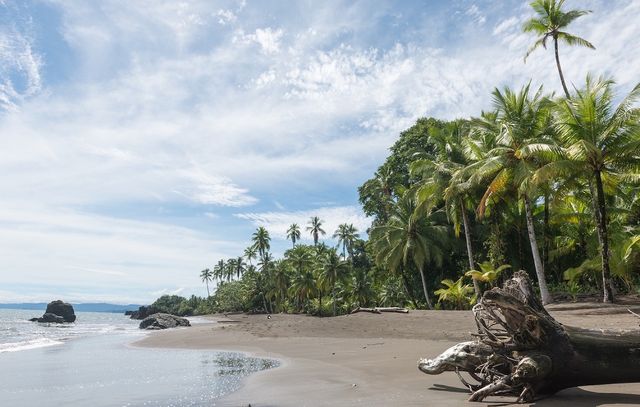
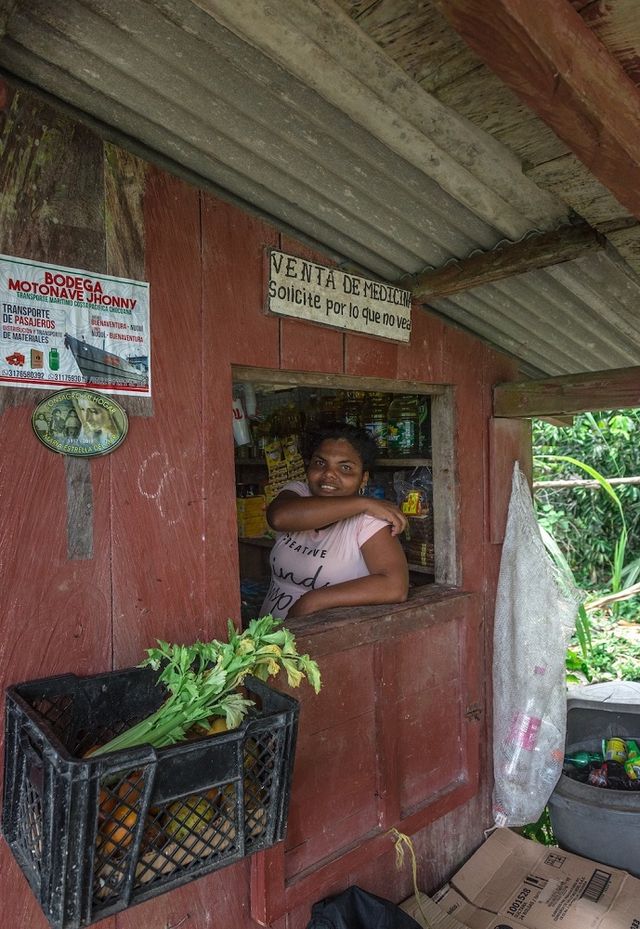
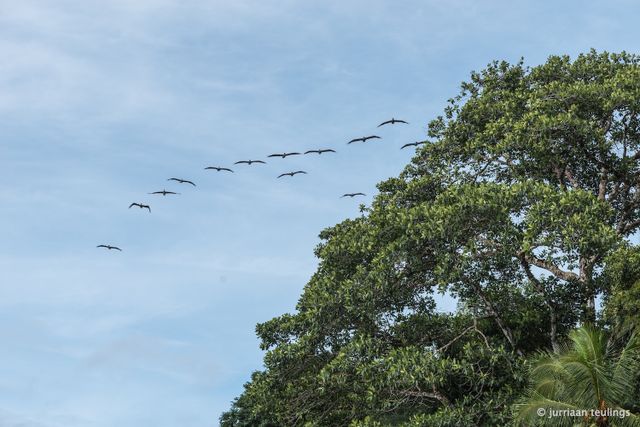
Surrounded by humpbacks
The next day I make a long walk through the pouring rain. This region is one of the wettest on earth. Yet the beach under the grey rain clouds is beautiful. I trek for hours along completely deserted bays and overgrown peninsulas; clambering over fallen forest giants and dramatic rock formations. Soon I am so drenched that I don't bother to take off my shoes to cross a small river.
The rain stops, so I can spend the last hours of the day in a boat at sea to see the whales up close. It takes some searching, but after an hour we are suddenly surrounded by humpbacks. Their fins are full of scars from the long migrations between these equatorial waters and those of Antarctica.
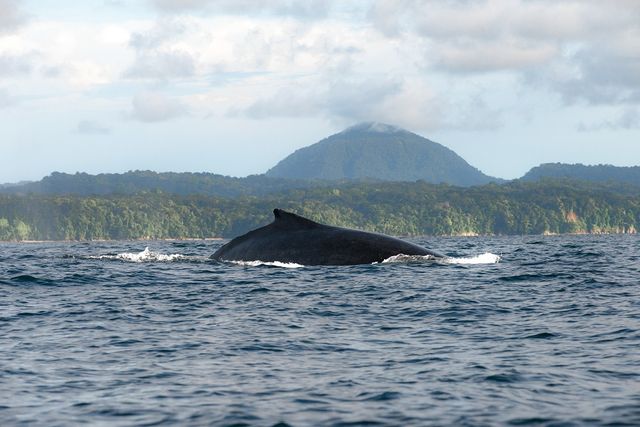
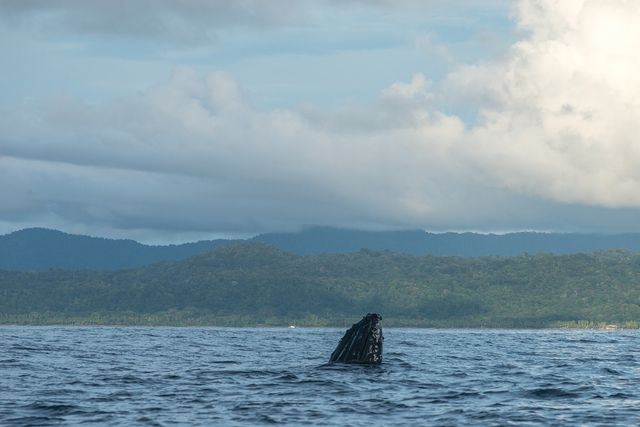
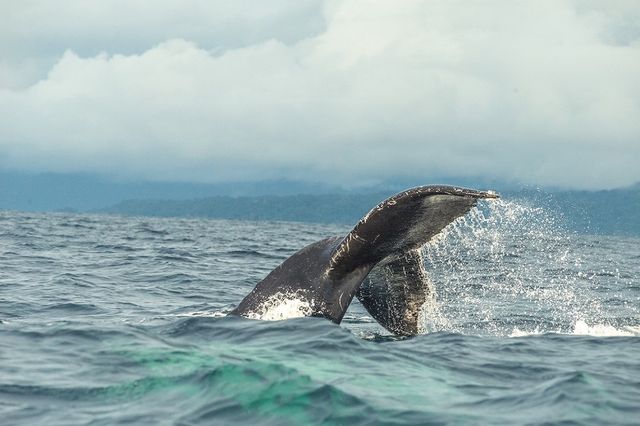
Natural whirlpool
In the evening I get in a conversation with Carlos, a director from Bogota who was so familiar with the staff that for a moment I thought he was the owner. But no, he says, the owner is Maximiliano, an eighty-year-old whose eight children and grandchildren run the lodge and the surrounding land. It turns out that Carlos, too, has found his paradise here, since he was forced to spend the night in Nuquí by a storm twenty years ago. Since then he has been here as often as he can. Even at the beginning of the century, when the guerrillas and paramilitaries made it unsafe here, he kept coming. "Everything is changing here; do you feel that? Now that the war is over, you have to get used to tourism here."
He invited me to accompany him the next afternoon with two of his friends, film producers from France, on a boat trip through the jungle near Joví, the village north of La Joviseña. The shallow river is navigated in a chingo, a wobbly boat that is in fact nothing more than a hollowed-out tree trunk. A slender, muscular boy at the front propels us deftly with a stick through a few rapids. We sail up a tributary with crystal clear water, until it is so shallow that we have to continue walking, with the flowing water along our ankles. So, we wade in a quarter of an hour to the place where the river, with its exotic splendour, plunges over two large rocks - a two-storey waterfall. The lower rock is about four metres high. Along one side of it, the waterfall rages through a trench that is just wide enough to stand in for a refreshing shower.
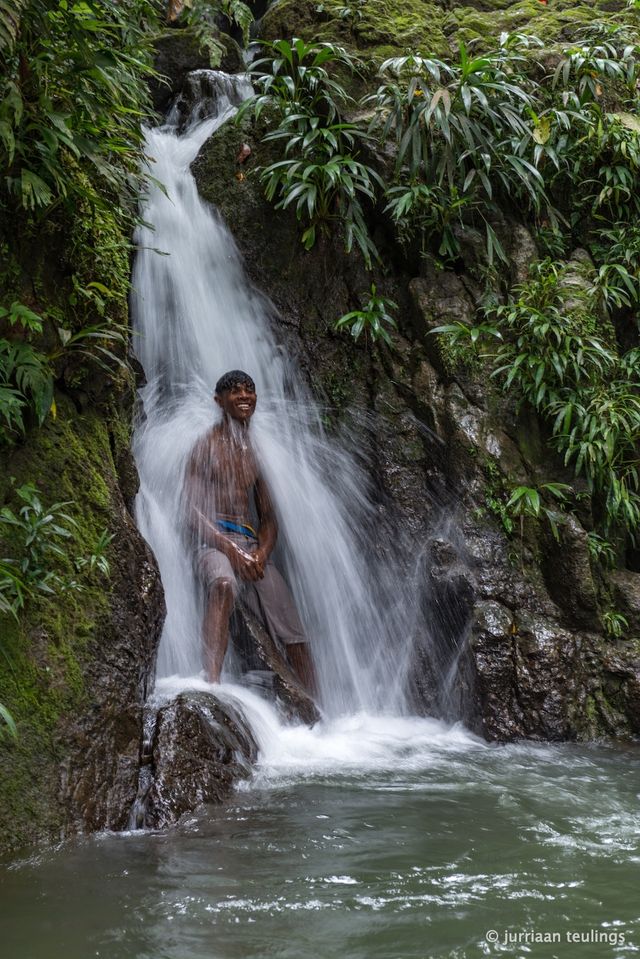
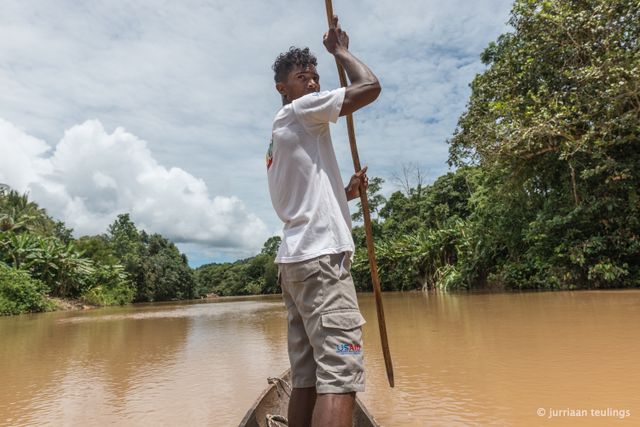
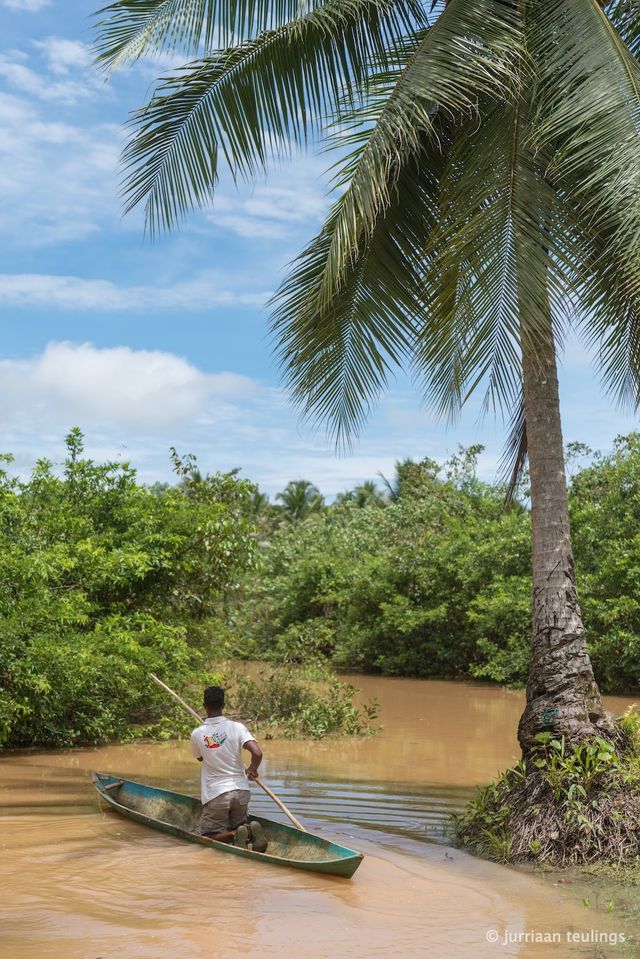
Over the middle of the rock runs a coarsely carved staircase with two ropes on either side, from which we carefully pull ourselves up to the second floor of the upper waterfall. Here the falling water has cut a small but deep whirlpool out of the rock. One by one we jump into it full of devotion. It's a kind of washing machine: the swirling water pulls us in turn under the waterfall for a short water massage, to spit us out on the other side for the next round. Exactly what you expect from a tropical swimming paradise.
“ The river plunges with a lot of exotic splendour over two large rocks. ”
Disappeared iguanas
We return just in time for that afternoon's whale watching tour. This time one of the giants treats us to a special moment, by showing up with his head instead of the usual tail above the waves. For a moment we think that the beast is going to make the photogenic leap that advertises the destination on tourist posters. But it's just the teaser. By the way, it still delivers a beautiful spectacle in the late afternoon light, with the green uninhabited coast in the background. During dinner, I will talk to Carlos about the tourism that is coming. He hopes that it will develop sustainably here, both for nature and for the local population. He himself has plans for a protected breeding ground for iguanas. There used to be plenty of them, but they have almost disappeared due to the increasing presence of dogs eating their eggs. "This is a sensitive subject. People here are very fond of their dogs."
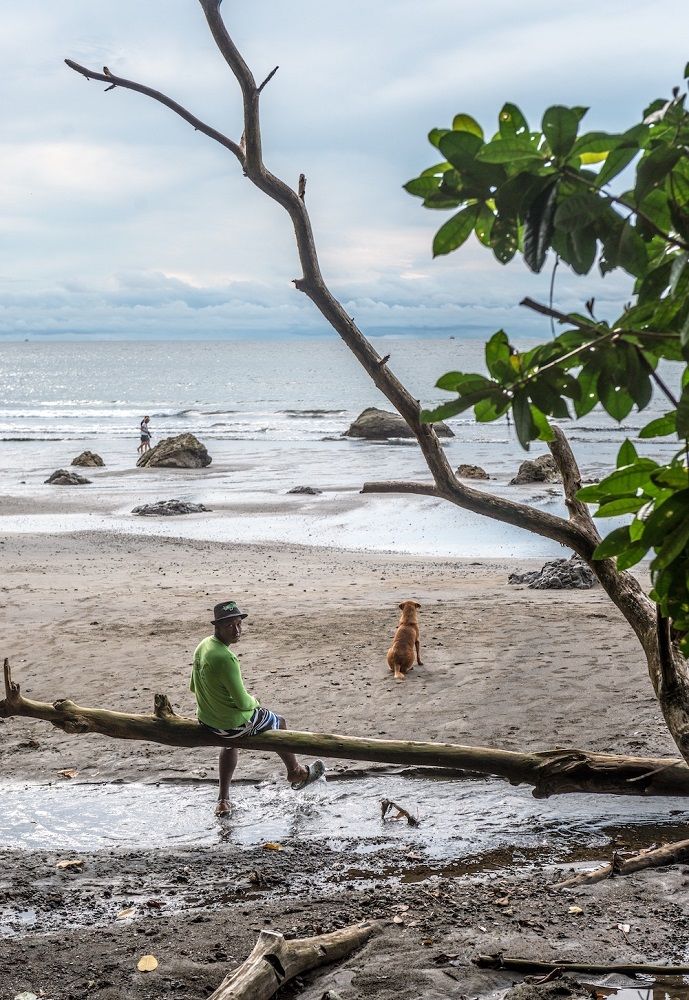
After dessert, a bottle of vinete opens: a cloudy moonshine of sugar cane fired by the locals and flavoured with cinnamon, cloves and vanilla. It tastes fine, but the third glass is followed by a popping headache. Carlos knows a thing or two about that: a night dive into the surf. He instructs me to dress as lightly as possible. A little later, when we are standing in pitch-dark surf, I see why: luminous algae attach themselves to my T-shirt and I light up like a Christmas tree. Then the cloud cover opens above us, and the star roof reveals itself once more. Between the shop of the surf and the sky, the magic is complete.
More about a trip through Colombia?
Would you like to know more about a trip to Colombia including a visit to Nuquí? We are happy to help you. Feel free to contact us for more information or a tailor-made travel proposal. Call +31 73 610 62 04 or send an email to info@sapapanatravel.nl.